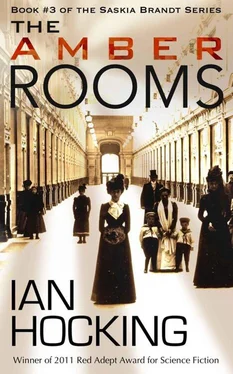‘Adaptation,’ said Saskia, ‘not improvement. There is no distant ideal for an evolutionary process. There is only the random variation of present generation and the non-random method of its selection.’
‘That is beside the point. Darwin saw the process as gradual, despite the gaps in the fossil record. It could equally be true, however, that those gaps are not merely the absence of gradual development, but evidence of great leaps.’
‘You are forgetting Linnaeus.’
Excitedly, he said, ‘But what if there come moments of rapid change?’
‘Revolution, not evolution?’ Saskia sipped her coffee. ‘That sounds rather like the theory of punctuated equilibria. Flim-flam, comrade.’
‘But you agree that the evidence currently fits both interpretations.’
‘Currently. Now what of Marx?’
‘Marx?’ He opened his arms to the view. ‘Nothing less than everything. A change in the quality of things from one instant to the next. A lost equilibrium, to use your phrase, and the collapse of the world order. You disagree?’
Saskia did not look away from the smoky rooftops.
‘Does that make revolution a natural consequence?’
‘Plato teaches us that natural government cannot be democratic, because the crowd is a mob, and a mob is unthinking. And yet when we consider non-democratic alternatives, the issues become equally intractable. Who is selected to govern? Why? And who does the selecting? You, Lynx? Me?’
‘You have not answered my question.’ She added, quietly, ‘And you can read what you like in Plato.’
‘Do you know why Plato was so-named?’
‘Of course,’ Saskia said. She was tiring of his fervour. ‘He was a strong sportsman with an admired musculature.’
‘There is always a dialogue between strength and knowledge.’
‘Would it be simplistic to say that all the meanings of strength are linked to all meanings of knowledge?’
‘How like Socrates you are, Lynx. Ready to question an idea but slow to answer with your own.’ Soso shook his head. ‘There is always a dialogue. I tell you, it will take a strong man to rise above the trappings of the sheep and assume the role of shepherd.’
‘Who will that be? You?’
‘No,’ said Soso, laughing. ‘Other men. Like my friend in the north. He is the superman.’
Saskia sighed. ‘Do you remember what I replied when you first asked me about the Tsar?’
‘Word for word,’ said Soso. ‘“Tyrants conduct monologues above a million solitudes”. From the Frenchman, Camus, whose work I will seek out presently.’
‘What do you say to it?’
‘I refer you to Gogol’s ‘Diary of a Madman’. In that story, a cleric, suffering a state of aberration, believes himself to be the King of Spain. That is the fate of all megalomaniacs.’
‘Meaning?’
‘The superman must remain of the people. He must place them first in his thoughts. Even if he is to rise above their pettiness and compel them towards actions they find disagreeable. He must stand on their shoulders.’
Twenty-five million people will die beneath his boots , she thought. Saskia looked over the rail. The first rocks were sixty feet below. She considered whether she should kill this man. It would be her first true murder. She had shot Cossacks the day before, but they were maimed and dying: that was euthanasia, a topic on which Plato was not silent.
And yet there was a particular future. She had seen it. Stalin would stand while his contemporaries fell. He would inherit the revolution. How could she stop him? He was as immortal as she was. Nothing could touch him.
Soso smiled. ‘It is a long way down.’
Saskia said nothing.
‘Does it bother you? Your wrist?’
‘No.’
‘Poor Lynx. I, of course, can’t move my left arm at the elbow.’
‘Small world.’
They sipped their coffees. A vulture turned in a thermal.
‘One Epiphany in Gori many years ago,’ said Soso, calm once more, ‘there was a great commotion. Mourners entered the village carrying the body of a young boy. People came to stare on Tsarskaya Street. The women muttered that there was a curse on Ekaterina Geladze, who had now lost her boy as well as her husband. Friends of the boy gathered. ‘What happened?’ was the question. Well, they replied, the dead boy had been hit by a runaway phaeton over at the main bridge. Look at his matted, bloodied hair and his pale skin!
‘As the procession reached the house of the dead boy, his mother ran out. She was wailing. She picked up the boy and screamed at him. She wept with lost love. But at her tears, which fell upon his cold face, the dead boy woke up. Though he never regained the full use of his arm, he lived.’
‘That’s quite a story.’
‘Now do you see, Lynx? You cannot kill me.’
Saskia frowned at him. Her fingers dug into the coffee cup. She decided to replace her serious expression with a smile. ‘Your jokes sometimes escape me.’
Soso looked behind her.
She turned as Kamo swung the samovar. It struck her forehead with an absurd, gong-like sound. Blood ran into her eyes and she raised her hand to clear it. Soso and Kamo took a leg each. Saskia twisted but she had no purchase.
I cannot die.
‘Sorry,’ said Kamo, as she was flipped.
She screamed long enough to empty her lungs.
If I can die, then he can die too.
Before she could draw air again, her body struck the rocks and shattered.
There is a realm, perhaps only imagined, of many Amber Rooms. Their walls are translucent. Through them, Saskia can see the outlines of still more Amber Rooms, overlapping into infinity. This place is a great building of buildings: a matrix whose Amber Rooms are connected by enfilades in six directions. Saskia is not a person here. Instead, she is a wisp that threads these enfilades. She knows that each Amber Room is a world. On its walls are not allegories of touch, smell, and vision but windows upon landscapes, dreams, and meaning.
This is not a museum, or a mausoleum, or an ark. Its proper word does not exist in any of the human languages that Saskia knows. This place is an equation. Certainly, it holds the beauty of an equation and the unfolding power of permutation.
A permutation might be the collective noun for this building of buildings.
Saskia appears to be alone, but there is another, unnamed something that speaks to her. Curator is not the word; neither is ghost. But it has no substance and it has all knowledge. It has told her that each Amber Room protects—or grips, or preserves, or marks the boundaries of—a reality.
She drifts on. The instants pass like the erosion of mountains. Millennia might fit between her blinks. Her thoughts are yoked to this slow time, however, and she feels no difference in her being, apart from a distant worry that she has become separated from what it means to be human.
The tour continues.
In one Amber Room, Saskia Brandt was born with fair hair. There are six exits here: the four walls, as well as the floor and ceiling. If Saskia were to float upwards and continue through the infinite suite, those other Saskia Brandts would be born with fairer and fairer hair. If Saskia were to float down, the hair of those others would darken.
Everything is here.
If this is not an ark, or a museum, or a tomb for reality, what can it be?
She drifts towards one of the small pictures, surrounded by a broken paving of amber. The artist has rendered a pastoral scene of the steppe. Close, the chimney of a farmhouse grows a lock of smoke. Its flat roof is loaded with fodder. Winter is close. On a far crag, a wolf in silhouette pulls back to howl. How distant is the tang of the Caspian? In this scene, the air would be dry. The poplar leaves are butter-coloured. They are falling in concert with a particular music known only to those who live season to season.
Читать дальше












